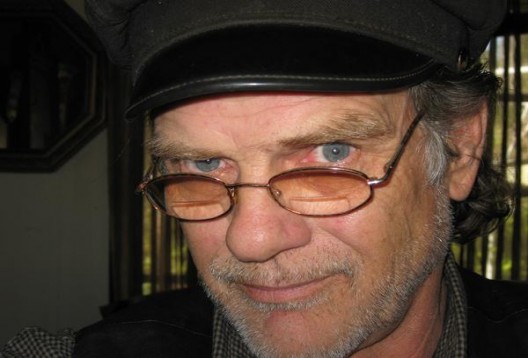Barker's songwriting career began in Texas at breakfast, lunch and dinner times, and without knowing how the process worked or how a song would sound or feel. "Many people, when they start writing songs, just start writing," Barker said. "They don't know what is going to happen. I went to the Texas school of songwriting. That is, you go down to the local Denny's and have a stack of napkins and Bic pen, and you sit there and drink coffee until you learn how to write songs. I filled up a lot of napkins."
After a year in Houston, Barker moved west to Los Angeles to write and produce songs for Sunwest Recording Studio. During this time period, such artists as Gordon Lightfoot, Ry Cooder, Linda Ronstadt, the Turtles, Jackie DeShannon, and Alice Cooper were recording at Sunwest.
Barker's life took a dramatic turn in 1970. Sceptor Records offered him a deal to sign with the label. Everything looked fine and the undiscovered artist envisioned a bright future until one day the card came in the mail, --the draft card from the United States government. The government ordered Barker's presence at the local military entrance-processing center so to draft him into the armed forces. Barker ultimately was forced to drop the songwriting deal with Scepter Records and joined the United States Air Force. During the next four years, he worked as a tactical air control specialist, a career field in which airmen are attached to U.S. Army units.
After completing his air force tour in 1974, Barker returned to Los Angeles and spent a decade performing as a musician on the Hollywood strip with singer Calista Carradine, daughter of famed Kung Fu movie man David Carradine. He also worked on movie sets with actors and actresses Jack Nicholson, Jessica Lange, Jodi Foster, Kim Bassinger, David Carradine, Jackie Gleason, Rock Hudson, and Meg Ryan. After a decade of establishing his name in the LA music scene, the songwriter performed at the 1984 Olympics World Lacrosse Games in Whittier, Calif. In addition, that year, the Count Dracula Society inducted Michael Jackson and his "Thriller" video during a party at the exclusive Masquers Club in Hollywood. Barker performed at this event, then packed his belongings and headed east for Austin, Texas and its blues music scene led by Stevie Ray Vaughan.
After more than 14 years since turning down his deal with Sceptor Records, Barker was about to find a niche that would begin to pay off. In Austin, he managed "Blazes", a venue for original music, located on East 6th Street. He also joined the Austin Songwriting Association, and video taped various film groups and Access Television shows in the Austin area. Then he opened "The Loft" on East 6th Street, offering avant-garde disc jockeys and local bands the opportunities to present their artistic visions to the public. During this time, the songwriter helped founding father Louis Jay Meyers build the South by Southwest Music Festival. He also established Brain Aflame Music in 1990, which serves as his personal music publishing business today.
Fully immersed in the Austin music scene, Barker wrote and collaborated with other writers, including Wayne "the Train" Hancock. Warner Brothers offered him a deal to place several songs with various artists in the United States and Europe.
One song Barker wrote became a big hit in Europe when the recording artist released the song on his album after changing the style of the original piece. "Valley Far Below," which European superstar Calvin Russell recorded, shot up the European charts upon its release in 1995. The success of Russell's gold album and Barker's song provided a wonderful opportunity to connect with the publishing world. Originally envisioned as a fingerpicking folk song, Russell rearranged "Valley Far Below" into a rock song, and changed some of the words. Barker didn't envision Russell ever changing his song, but he applauded the final version upon hearing it. "People would ask, 'How can you let him change your song?'" Barker said. In response, the Barker said, "It's like asking a slot machine, 'What are you going to do with my quarter?' Songwriters often become so fascinated with their own creativity that they lord over it as though it's written in stone, and it must be that way always, for all seasons, and all reasons. I believe that is an error because everyone hears music differently.
"I think it's important for writers to allow their creativity, once they plant the seed, to let the seed crack, and grow into what it is [to become]. That's an analogy in the Bible. When the seed goes into the ground, it dies; the seed is gone, the shell cracks, and what happens is a plant comes out. Writers need to realize their songs may have even more potential than they're aware of, and by allowing people to shape that piece of clay that they've brought to the table, they may get a more beautiful work of art than they have now."
For Barker, the success of "Valley Far Below" outweighs the changes made by the recording artist. The song now exists on the original compact disk, a greatest hits compact disk, and as a television video. Whenever radio and television stations in Switzerland, France, Belgium, Germany, and other countries air the song, and whenever people buy the album, Michael earns a living � about a nickel every time it's played or purchased. A nickel may not be a lot of money, Barker said, but when a royalty check amounts to almost $2,000, "that's a lot of nickels."
In 1996, Barker established Rumplestiltskin Records and released several of his songs on a compact disk titled "Cool Breeze." The label also released a 10th anniversary disk of "Three Balls of Fire" in 1998, as well as cassette tapes of "Jes' Folk," "So This Is Love," a country music sampler, an instrumental Christmas tape, and a Christian gospel/opera titled "Testimony."
| Date |
Venue |
City |
State |
Note |
| No Tour Dates Available |

